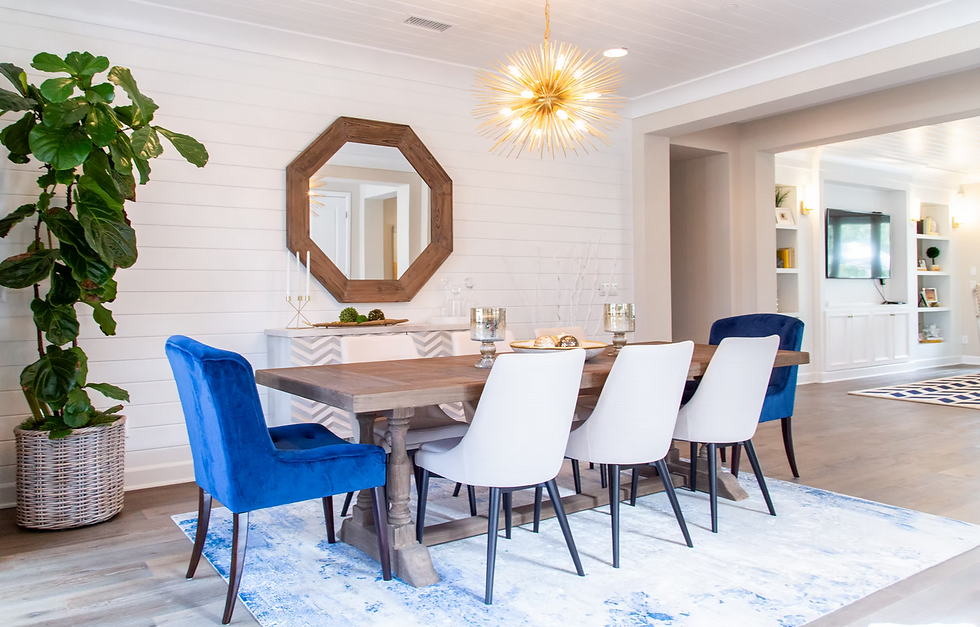Learn How to Choose the Right Interior Designer For Your Project
- Vision Interiors
- Dec 5, 2019
- 4 min read

A house is likely one of the largest investments you'll make and chances are that between sleeping and waking hours, you spend more time there than anywhere else.
If you are beginning fresh with furnishings or decor, or even bringing all the pieces you own into a new space, an interior designer can be extremely helpful. They will learn about your lifestyle, assess the spaces in the house and thoroughly think about the many design options available to develop a plan that yields the most gorgeous, functional results.
Why Do You Need An Interior Designer?
A reputable interior designer will bring a skilled eye and experience to your project that might be a BIG time and money saver.
While some clients steer away from hiring a professional interior designer because they are fearful of the price, an interior designer can help you avoid expensive mistakes. Money isn’t the only thing your designer can help you save — he or she will also save you time.
You won’t have to invest endless hours in researching products and ideas. Because of the designer’s deep knowledge base, they can educate you about product options that fit your budget — options you wouldn’t otherwise not even known of.
Interior designers have access to furniture and lighting companies that typically the general public can not order from or don’t even know exist. Furthermore, interior designers also know which companies have quality pieces and, because custom orders are non-refundable final sales, your interior designer can save you money by not making a mistake.
In addition to their knowledge of product lines, interior designers have exceptional relationships with vendors that they trust and can count on to deliver in a timely manner with predictable quality.
They’ve spent years cultivating their resource providers so they can access just the ideal thing for their clients. That’s the practical part. Then there’s the creative part.
An outstanding interior designer will design your home based on your lifestyle and ideas and take it to the next level that you wouldn’t able to accomplish on your own.
How to Choose An Interior Designer
If you believe that hiring an interior designer is the right choice for you, consider that not all interior designers are created equal and finding a good fit is pivotal to the success of your project.
Building Chemistry
Building a relationship and the ability to work well together is essential, so you must be both comfortable and compatible with each other’s personality and communication style.
Ask For Referrals
Remember to ask to review a portfolio of work because clearly understanding the designer’s access to a wide range of resources is crucial to managing time and budget.
Learn About Their Experience
Become educated about academic and professional organization credentials to help you in figure out whether the interior designer is a good fit for you.
Understand Their Artistic Ability
In our DIY society, almost just about anyone can be trained to arrange interiors or manage projects like a pro, but what can separate a good interior design project from an incredible one is the interior designer’s artistic qualities that evoke emotion and create the ultimate “wow” factor.
Establish Trust
You have to learn how to trust the design process. It involves much information gathering and evaluation, especially to figure out the needs and wants, so allow enough time and flexibility for the design process to grow into its natural process,
Set Some Expectations
You should also try and set mutual expectations from the beginning by using contracts to outline clear expectations, especially terms of responsibilities, communication, deliverables, budget and compensation.
Build a Good Relationship with Your Interior Designer
Remember, if you haven’t used an interior designer in the past, it’s a very personal process. You spend a great deal of time with this person. You will share personal information that makes your … result one (that) you are both extremely proud of.
Not only will you need to have a good relationship that allows you to be sure you are getting what you want, but you need to keep an open mind to new ideas. Because interior design choices are so personal, there is a tendency for homeowners to get emotional or have difficulty settling on choices that will have a long-term impact.
There should never be any drama involved. You should treat this as a professional relationship and a business relationship. All work, opinions and ideas should be fully respected.
As you start the interior design process, your designer will likely ask you for clips of interiors you like. Browse websites for inspiration and leaf through magazines too — share links and tab or tear out the pages that show rooms you can see yourself living in.
The more information you give your interior designer that accurately reflects your taste, the less likely you are to be unsatisfied. Keep in mind that your designer wants you to be completely happy, so the less guesswork there is, the better he or she can tailor everything to your needs.
At the end of the project, the client should feel that they had help in creating a space that reflects them and their style — one that tells a personal story and that they can sit back in a space that exceeds their expectations.
The interior designer should feel proud they met new obstacles professionally, learned something new and helped a family create a space that will make them happy to come home.




Comments